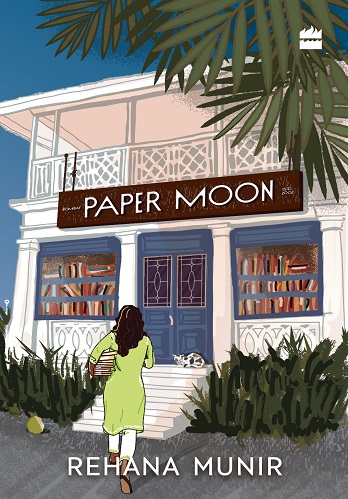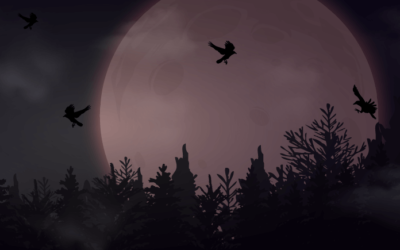Excerpt
Paper Moon

Life hasn’t really begun yet, thought Fiza one still afternoon on the bus to the Kalina University campus. And yet, here was this ending – so final. So surprisingly hurtful. She really did love him. But was she simply too afraid to get into the mess of real life? But who defined ‘real life’? To Dhruv, the future was to be invented. She, on the other hand, thought of the future as something to respond to. In this, she admired Dhruv; he was so sure of what he wanted. Always chasing after something. Shaping the world to fit his size.
The MA was a natural progression after her BA. It allowed Fiza another couple of years in the safety of books. There would be time to find a way into the outside world, but she was in no hurry to get there. She had already begun contributing to household expenses, writing short pieces for websites and magazines, and taking up editing jobs. She sometimes tutored students in English language and literature. It wasn’t much, but it pointed to future options.
After the decorative pillars and echoing corridors of her college, the university campus was a letdown, with dreary government-style buildings dotting an unkempt forest. But it wasn’t the facilities that made students lose their enthusiasm; it was the faculty. The English department professors ranged from the criminally dull to the hopelessly inept. Luckily, a bunch of German exchange students livened up proceedings with their enthusiasm for theatre. One quiet afternoon, the towering David from Hamburg peeped into Fiza’s classroom. Her first impression was: Hugh Grant, only taller and younger. She was disappointed to find out that he lodged on campus with his charming wife. Twenty-two years old and already married! If this was a new European trend, she heartily disapproved.
The Germans were running auditions for a play, a Shakespearean parody put together in an attempt to beat the campus blues. Fiza would never have considered it, but David was adamant she read for the lead role: they were desperate to find someone who’d carry off the English dialogue, and that was one skill she couldn’t say she didn’t have. So, every afternoon after lectures, she’d meet the theatre bunch in a disused classroom. It rid her of the awful feeling of stagnation that the campus – and her life at that moment – evoked.
After rehearsals one Friday afternoon, Fiza was lucky to catch the double-decker bus just pulling up at the stop. Settling into the much-vied-for first seat on the upper tier, she plunged into Catch-22, prescribed for her American Literature class. Luckily for Joseph Heller, the novel was being taught by visiting faculty. Earlier, in a rare talkative moment in class, she’d said out loud, ‘There’s so much pathos in the character of the chaplain. He’s a man of faith, struggling with doubt. That’s so difficult.’ Mrs Ghosh, the live-wire guest lecturer, had launched into a spirited discussion based on that comment. She had that special teacherly talent for spinning wisdom out of seeming banalities.
Fiza got off the bus and headed straight to the coconut seller, Ismail, who conducted business from the streetlamp outside her building. As he beheaded a coconut with practised ease, she noticed he’d given his hair a fresh coat of jet-black dye. Fiza had always admired his confidence, his cheerfulness. Looking at the world through one good eye, Ismail found himself equal to it.
Up in her flat, she found her mother’s room empty, and a sticky note on the fridge: ‘At Bharti’s for dinner. Maria’s made cutlets for you. XX’. Fiza headed straight for the prawn cutlets, but was waylaid by the ringing phone.
‘Hello?’
‘Hello. Is that Fiza Khalid?’
‘Yes. May I know who’s speaking?’
‘D.K. Batliwala.’
‘Sorry, do I…?’
‘No, but I’m a friend of Iqbal’s. Your father.’
Fiza instinctively raised her guard.
‘I would have asked to speak to Noor, but your father insisted that you heard it first.’
‘Hear what?’ Fiza uttered, with a calmness she didn’t feel.
‘Iqbal is … gone. He had been ill for a while, and he was prepared for it. The end was painless. Everything happened according to his wishes. I’m so sorry.’
Her mother’s words flashed quickly through her mind: ‘He had other plans for his life.’ Even death was a planned affair.
‘I’m sorry, this must be very sudden and difficult—’ the voice continued tentatively.
‘Thank you for informing me, but I’m not sure what I can do about any of this,’ Fiza cut in.
‘His body has been donated to cancer research, as per his wishes. He didn’t want any ceremony or memorial.’
That was precious information about her father. He was a man who had no wish for ritual or mourning. He was.
‘Can we meet sometime soon? There’s an important matter concerning your father. When would you be free to meet? Are you still at Little Flower?’
The ease with which the stranger just mentioned her building’s name discomfited Fiza even further. Pulling out her voice from somewhere dark and deep, she murmured, ‘I’m sorry. I need to speak to my mother before we can—’
‘Yes, of course. I understand. Please let Noor know D.K. called. Will you take down my number, please?’
Fiza distractedly pulled an electricity bill, still in its envelope, from the centre table. Have to pay this soon, she made a mental note. Her mind was pretending that things were okay, that there was no need to panic. The phone pen was missing, so she fished out a kajal pencil from her bag, robotically writing the number she heard on the other end of the line.
‘You can call any time between ten and six on a weekday, beta. I’ll wait for your call. And once again, I’m sorry to give you this news.’
Fiza put the receiver down and gazed blankly at her living room. Everything seemed slightly altered, vaguely menacing. She considered calling her mother at Bharti Aunty’s, but found the thought to be absurd. Giving her mother information about her father – this was not how it worked. She walked to her room and got into bed, unsure whether her limbs and faculties were still at her command. Fiza didn’t know how much time had passed before her mother walked into the dark room, wondering why the food in the kitchen had remained untouched.
‘Fizu, all okay? Are you ill, beta?’ she asked, turning on the light.
Fiza hadn’t noticed, but her face was wet with tears. She would later wonder what the tears meant. Pain or anger? Regret or disappointment? At that moment, all she felt was an intense estrangement from her own life and body. It was like losing a loved one in a dream.
‘What is it, Fiza? Something to do with Dhruv? Beta, you can still work it out. Nothing’s really final—’
‘I received a phone call from someone called D.K.,’ Fiza began.
‘D.K.? D.K. Batliwala? Iqbal’s friend?’
‘Yes.’
‘What does he want all of a sudden?’ Noor asked belligerently.
‘I don’t know yet.’
‘He called for you?’
‘Yes. Though he mentioned you, too.’
‘And? Fizu what’s with the suspense?’
‘He said … he said my father was dead.’
Noor sank into Fiza’s bed and clutched her daughter’s foot in a desperate gesture. ‘What?’ she whispered.
‘Cancer, I think. Or that’s what his body is donated to. Research. There was no ceremony. He didn’t want rituals.’ The words were coming out scrambled. She didn’t want to leave a single detail out. Didn’t want to leave anything in.
Taking both of Fiza’s feet in her hands, Noor said, ‘I’m so sorry, Fizu, but he never once said he wanted to meet or to include you…’
For the first time since she had heard the news, it occurred to Fiza that it would be painful for her mother to hear it. Seeing her mother hurt, voice choking with unidentifiable emotions, Fiza snapped out of her stupor.
‘I know,’ she said, still unable to move.
‘Did D.K. leave a number?’ Noor asked, not sure what else she needed to hear.
‘Yes. He said there’s something he wanted to discuss with me…’
‘Oh. I hope Iqbal hasn’t left any debt …’ she said with characteristic caution.
‘No, it didn’t sound like that,’ Fiza replied, unused to hearing her mother say her father’s name.
‘What did it sound like?’
‘I’m not sure.’
‘I should call Bharti,’ Noor said and walked out.
Fiza was relieved to see her mother leave the room. This was not a scene they had rehearsed even in their thoughts. And yet, it had always been a looming possibility. The initial shock was already giving way to deep melancholy.
***
It was 10 a.m. and Fiza was dialling the number she had jotted down the previous evening.
‘Hello, is this Mr Batliwala?’
‘Hello, Fiza? And you can call me D.K. Everybody does.’
His voice sounded friendly today, even cheerful. She wondered how long it had been since her father’s death.
‘If it is convenient, I can pick you up from your home today at twelve.’
‘I can meet you at your office or wherever directly—’ Fiza replied stiffly.
‘No, that’s all right. I’ll be passing that way anyway. So I’ll see you downstairs. How is Noor? How did she deal with the news?’
Fiza was still uncomfortable sharing private details with this near-stranger. ‘She’s okay. Yes, I’ll see you at twelve.’
‘Okay. And please carry some ID proof, if you can. It will help to get things started. Bye, then.’
So this was about legalities. Could it be that her father had been in financial trouble, like her mother had feared? But the conversation with D.K. was far too pleasant for that to be the case. Inheritance was out of the question. He hadn’t even bothered to say hello in two decades. Fiza put her voter’s ID and passport in her bag and waited for noon.
A new thought entered Fiza’s mind for the first time since hearing the difficult news the previous evening: should she email Dhruv? They hadn’t spoken since he had left the previous month, and she wasn’t sure this was the best icebreaker. The thought of Kavya, her college friend, crossed her mind, but this news was too sudden to spring on her, and completely without foreshadowing. Fiza didn’t yet have the language to deal with the situation. There was just no template for this kind of thing.
D.K. was promptly at her gate at twelve, waiting in his grey Hyundai Accent. He opened the front door for her and greeted her warmly – like she were the daughter of a close friend. He looked distinguished and agreeable, something in his manner suggesting compassion.
‘So … you’re studying?’
‘Yes. I’m at Bombay University, doing an MA.’
‘Oh. Good, good. What are you studying?’
‘English literature.’
‘Ah, that’s wonderful. Iqbal used to worry you would be one of those MBA types. But he hoped you’d be a book-lover. He was banking on it, almost,’ he carried on familiarly.
Fiza was part bewildered and part resentful. Her father had conducted casual conversations about her, speculating about her interests while never once reaching out to her in over twenty years.
D.K. sensed her discomfort and changed the topic.
‘Is Noor well?’
‘Yes, thanks. She’s a bit—’
‘I can imagine. But she’s a strong woman. And she’s raised you well.’
There it was again. Him speaking about her like he knew her. Knew what it had been like for Noor.
They were soon pulling over at an old commercial complex in Prabhadevi. Up in his wood-panelled office, D.K. got straight to the point.
‘Fiza, this is going to come as a bit of a surprise to you – over and above the shock of Iqbal’s…’
On high alert, Fiza gave nothing away with her expressions.
‘Your father was a complex man. Too much reading and thinking. He was a perfectionist. If he didn’t think he could do something well, he just gave it up and never looked back. He knew that was his biggest problem, and still…’
Fiza took a sip of the water placed before her, pretending this was a story she was hearing about strangers.
‘He built a good life for himself. Even did well. But he was disturbed by – by what happened with Noor and you. He knew he had behaved…’ D.K. looked up awkwardly, leaving the sentence trailing. ‘But he was also sure that he was not capable of making amends.’
‘He chose not to,’ Fiza said, shaking off her superficial composure.
‘Yes, you’re entitled to your response. Anyway, I’m not here to fight a case for him, beta. At this point, all I’ll say is he was a great friend of mine and leave it at that.’
‘You asked me to carry an ID,’ Fiza said, eager to escape the oppressive situation.
‘Yes. But before that, I’d like you to listen very carefully. Your father was not a rich man. But he was wise with his money. And he had put away enough to fulfil a dream. He wanted to spend his retirement running a bookshop in Bombay. He loved Bombay till the end, even though he left,’ D.K. said in a voice he was trying hard to keep steady.
At this point, Fiza experienced a swell of emotion even greater than when she had heard about his passing. My father wanted to run a bookshop, she recited in her head. This was something she found to be immeasurably sad and sweet.
‘But he was a practical man. When he was diagnosed with cancer four years ago, he began to put all his finances together and even wrote a will. He left money for his brother and some of his other relatives in Bangalore, but he also put away a sum for the bookshop he had always wanted.’
Fiza was trying to keep up. She was used to piecing together her father’s life using hard-won information gathered over years – a Frankenstein created out of scraps of her mother’s memories. Now, here was a flood of facts she wasn’t prepared for. He had lived in Bangalore. She had an uncle. Perhaps cousins. She tried not to let them settle in her brain.
‘And you are the sole inheritor of that sum in his will.’
D.K. waited for the import of this statement to sink in, but all he got from Fiza was a silence imploring him to go on.
‘Did you – should I … go over what I just said?’
‘I’m sorry. Did you just say he’s left me money to set up a bookshop?’ Fiza stuttered.
‘Yes. You’ve got it, then,’ he smiled. ‘Which is why I was relieved when you said you were studying literature.’
‘And what if I weren’t?’
‘His wishes are just a suggestion. The money is yours, beta. Do what you like.’
‘This is all too much. All together,’ Fiza said after an uncomfortable pause.
‘I know. And I’m sorry this news had to be delivered to you in this way. But now you need to decide if you want to…’
‘Set up a bookshop with the money my father has left me,’ she said slowly, as if repeating a line in a foreign tongue.
‘That’s right. If you like.’
Fiza lowered her face and held it in her hands. She was neither in control of the thoughts in her head, nor of the expressions on her face. And her hands had gone very cold.

Rehana Munir ran a bookshop in Bombay in the mid 2000s and edited cricket websites a few years later. Now an independent writer on culture and lifestyle, she has a weekly humour column in HT Brunch, and a cinema column in Arts Illustrated magazine. Paper Moon, published by HarperCollins, is Rehana’s debut novel.
Excerpted with permission from Paper Moon, Rehana Munir, Harper Collins India, available online and at your nearest bookstore.



